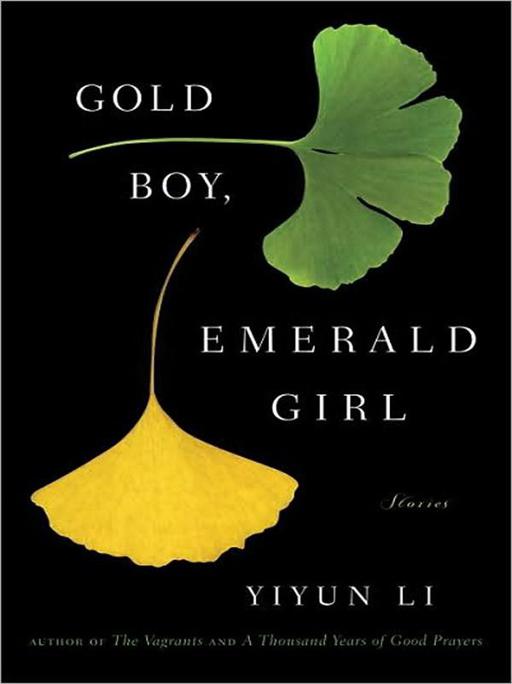
Gold Boy, Emerald Girl
Stories
کتاب های مرتبط
- اطلاعات
- نقد و بررسی
- دیدگاه کاربران
نقد و بررسی

Starred review from May 10, 2010
The nine brilliant stories in Li's collection (after The Vagrants) offer a frighteningly lucid vision of human fate. In the title story, motherless Siyu has long been in love with an older zoology professor, Dai, who suddenly wants Siyu, 38 and single, to marry Dai's gay 42-year-old son, Hanfeng. In "A Man Like Him," retired art teacher Fei embarks on a strange quest after reading a story about a Web site devoted to shaming a man who left his wife. Fei seeks out the man, needing to confide to him his own sordid brush with infamy. The collection's magnificent centerpiece is "Kindness," the novella-length reminiscence of a spiritually despondent math teacher named Moyan, whose bleak story begins with the emotional starvation she suffered from her adoptive parents and grimly continues over the years as two older women—an English teacher and Moyan's army superior—attempt, unsuccessfully, to reach out to her. Li's description of army life, and particularly her description of Moyan's regiment's march across Mount Dabi, is a bravura piece of writing, but it's Moyan's evolution from pitiable to borderline heroic (in her own way) that is Li's greatest achievement.

Starred review from July 1, 2010
A stellar assortment of stories about struggles to escape and connect in contemporary China.
Since her debut collection, A Thousand Years of Good Prayers (2005), Li has become a more ambitious and nuanced storyteller: Her first novel, The Vagrants (2009), was a striking cross-section of life in a small Chinese town affected by a young woman's execution; this book marks no thematic shifts, but the writing is slyer and deeper. The opening story, "Kindness," is a virtuosic novella in which a middle-aged woman recalls relationships with two crucial women in her life: a retired schoolteacher who provided a haven during the narrator's difficult childhood and the army lieutenant whose treatment of her veered from tenderness to humiliation. The narrator, writing as a 40-something, is shaken and isolated by her experiences, but also intriguingly self-aware, and Li skillfully balances this insecurity and self-regard. The remaining eight stories are shorter but no less powerful. In "Prison," a woman moves back to China from America to monitor the surrogate carrying her baby, opening up questions about servitude, class and parenthood. In "House Fire," a group of women gain celebrity for a public crusade against infidelity, but their confidence in their cause is unsettled when a timid man arrives for help. In "The Proprietress," a woman running a store near a prison arrogantly basks in the power she wields over her patrons. In the closing title story, a young man and women are pressured into an untenable but inevitable relationship. The prevailing emotion among Li's characters is entrapment: They are routinely feeling locked into relationships or predicaments, sometimes by the state, but usually by family or their own lack of will.
Further proof that Li deserves to be considered among the best living fiction writers.
(COPYRIGHT (2010) KIRKUS REVIEWS/NIELSEN BUSINESS MEDIA, INC. ALL RIGHTS RESERVED.)

June 15, 2010
Previously published in such venues as The New Yorker, the Guardian, and the San Francisco Chronicle, these nine stories are not interwoven, yet they share myriad common themes. Opening the collection is "Kindness," in which a 41-year-old single school teacher, an adoptee, recalls the kindness of a professor and a lieutenant when she served in the military. In "A Man Like Him," readers meet 66-year-old Teacher Fei, also an adoptee and an accused pedophile who arranges to meet the father of a 19-year-old woman he sees in a magazine and on her blog post. Matchmaking and companionship are common to the title piece and "Number Three, Garden Road," while the darker and more tragic themes of death and childlessness are evident in "Prison" and "The Proprietress." "House Fire" is the one story with a more humorous premise, as six older women work together to fight deteriorating morals. (Imagine six mature Chinese women in an undercover episode of the reality show Cheaters.) VERDICT As in The Vagrants, Li's writing is a window on life's darker side, particularly in China. Recommended for any reader interested in short stories and Asian fiction.--Shirley N. Quan, Orange Cty. P.L.s, Santa Ana, CA
Copyright 2010 Library Journal, LLC Used with permission.

August 1, 2010
Perhaps Lis medical training influences her unflinching scrutiny and diagnosis of repressive circumstances and the maladies of the soul they engender. Following her powerful first novel, Vagrants (2009), with her second substantial short story collection, Li focuses even more clinically on sensitive and distrustful men and women in China who were denied the opportunity to develop fully functional emotional lives. Kindness, a long, delving story about a stoic young woman serving her mandatory stint in the army and her reticent mentor, a retired literature professor, resembles an Anita Brookner tale in its unnerving blend of intensity and restraint. Prison is a chilling tale about a grief-stricken Chinese couple living in America who return to their homeland to find a surrogate mother, and its title neatly describes every other predicament in this dark yet covertly witty and caring collection about lonely and sad people. Betrayals and suicides are committed. Children are bought and sold. Yet, in several tales, including the funny, bittersweet title story, adjustments are made, solutions are found, and friendship and love survive like plants pushing through asphalt.(Reprinted with permission of Booklist, copyright 2010, American Library Association.)

























دیدگاه کاربران